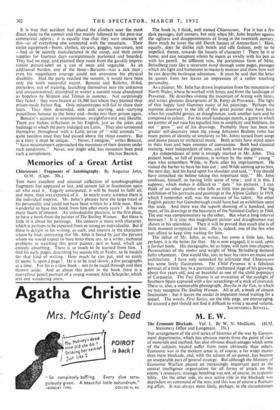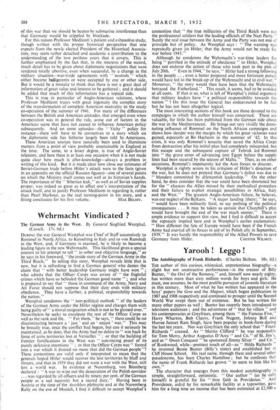M. E. W.
THE arrangement of the civil series of histories of the war by Govern- ment departments, which has obvious merits from the point of view of materials and method, has also obvious disadvantages which some of the subjects treated suffer from more obviously than others. Economic war in the modern sense is, of course, a far wider matter than mere blockade, and, with the advent of air-power, has become an inseparable part of general strategy. But although the Ministry of Economic Warfare played an increasingly important part as the central intelligence organisation for all forms of attack on the enemy's resources, strategic bombing was not, of course, its responsi- bility. On the other side, its own active role in the blockade was dependent on command of the seas, and this was of course a fluctuat- ing affair. It was always more likely, perhaps, in the circumstances
of this war that we should be beaten by submarine interference than that Germany would be crippled by blockade.
For this reason Professor Medlicott's patient and exhaustive study, though written with the proper historical perspective that one expects from the newly elected President of the Historical Associa- tion, may seem rather detached and academic a contribution to the understanding of the two perilous years that it covers. This is further emphasised by the fact that, in the interests of the record, much detail has to be given about diplomatic negotiations that were rendered totally abortive, even when successful, by a change in the military situation—war-trade agreements with " neutrals " which either became builigerents or were occupied by one or other side. But it would be a mistake to think that there is not a great deal of information of great value and interest to be gathered ; and it should be added that much of this information has a topical side.
This is true in particular of Anglo-American relations, where Professor Medlicott traces with great ingenuity the complex story of the transformation of complete American neutrality to the ready co-operation of the summer of 1941. For many of the differences between the British and American attitudes, that emerged even when co-operation was in general the rule, arose out of factors in the American scene that have not ceased to influence American policy subsequently. And on some episodes—the " Vichy " policy for instance—there will have to be correctives to a story which on the diplomatic side has hitherto largely been told by Americans.
These American sources have naturally been used to illuminate matters from a point of view probably unattainable in England at the time. The same, to a lesser degree, is true of Anglo-Soviet relations, and here there is at least one occasion when it is not made quite clear how much is after-knowledge—always a problem in writing of this kind. But it is made clear how close our estimates of Soviet-German trade before Hitler's attack were to the facts (given in an appendix on the official Russian figures)—one of several points on which the Ministry itself comes out well at its historian's hands. The importance of the " Siberian leak," as well as of Soviet supplies proper, was indeed so great as to affect one's interpretation of the attack itself, and to justify Professor Medlicott in regarding it, rather than Pearl Harbour, as the real turning-point in his story, and a fitting conclusion for his first volume. MAX BELOFF.



































 Previous page
Previous page